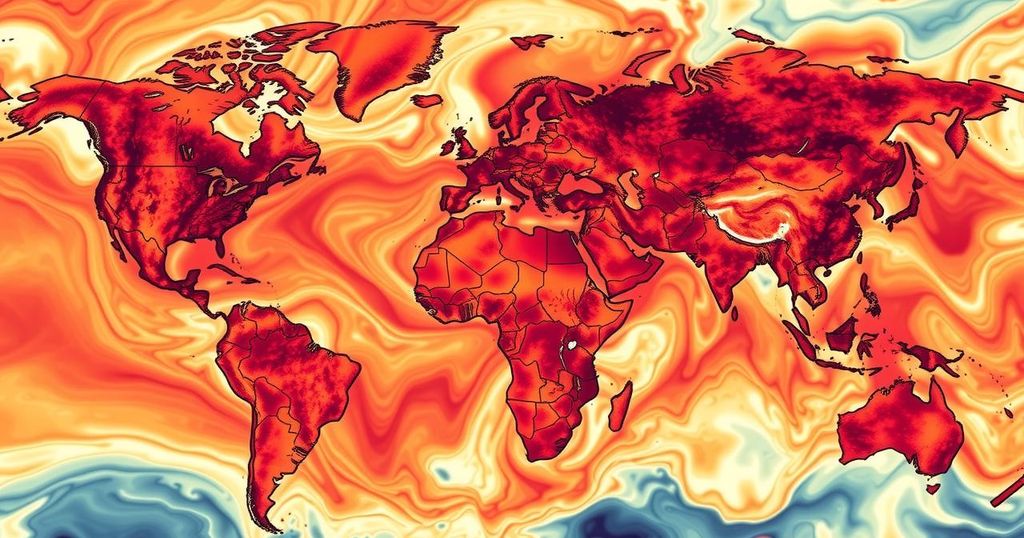Data indicates that 2024 is likely to be the hottest year on record, surpassing 1.5C above pre-industrial levels. This situation has intensified the urgency for climate action, as evidenced by increasing extreme weather incidents and economic losses, projected to reach $320 billion in 2024. Efforts to limit fossil fuel emissions must accelerate, despite challenges faced by recent climate summits.
Current data indicates that 2024 is poised to become the hottest year on record, with average global temperatures projected to surpass 1.5 degrees Celsius above pre-industrial levels for the first time. The Copernicus Climate Change Service (C3S) reported a global average surface temperature of 1.62 degrees Celsius above historical norms for November, leading to an annual average forecast of 1.60 degrees Celsius. Samantha Burgess, deputy director of C3S, noted, “We can now confirm with virtual certainty that 2024 will be the warmest year on record and the first calendar year above 1.5C. This does not mean that the Paris agreement has been breached, but it does mean ambitious climate action is more urgent than ever.”
Although the Paris Agreement seeks to maintain global warming below 1.5 degrees Celsius, this assessment pertains to a broader temporal context rather than specific annual metrics, complicating efforts to limit the climate crisis’s impacts. The data indicates an ongoing trend, with a mere 45 percent reduction in fossil fuel emissions by 2030 required to avert significant climate disruptions. Unfortunately, the recent COP29 climate summit failed to establish a clear pathway for diminishing reliance on fossil fuels. Moreover, 16 out of the last 17 months have now seen temperatures exceeding 1.5 degrees Celsius.
The repercussions of climate change are becoming increasingly evident as extreme weather events intensify. In 2024, the world witnessed unprecedented wildfires affecting vast areas in North and South America, exacerbated by severe drought conditions. Mark Parrington, a senior scientist at the Copernicus Atmosphere Monitoring Service, stated, “The scale of some of the fires in 2024 were at historic levels, especially in Bolivia, the Pantanal and parts of the Amazon. Canadian wildfires were again extreme although not at the record scale of 2023.” This combination of wildfires, hurricanes, and heavy storms has contributed to escalating economic damages attributable to climate-related incidents.
Swiss Re’s research indicates that economic losses due to climate change in 2024 rose by 6 percent from the previous year, totaling $320 billion, marking a 25 percent increase over the past decade’s average. Furthermore, insurance coverage for these losses remains inadequate for many, particularly in economically disadvantaged regions. As urbanization advances in high-risk areas, the frequency and severity of such damages are anticipated to grow. Swiss Re emphasized that, “Adaptation is therefore key, and protective measures, such as dykes, dams and flood gates, are up to 10 times more cost-effective than rebuilding.”
The escalation of the climate crisis is underscored by the latest data forecasting 2024 as the hottest year on record. This information comes from the EU’s Copernicus Climate Change Service, which tracks global temperature changes in relation to pre-industrial levels. The urgency regarding climate action has increased as the world anticipates significant climate shifts and their resultant impacts, considering previous international agreements like the Paris Agreement aim to mitigate global temperature rises. As countries grapple with their commitments to reduce greenhouse gas emissions, the phenomenon of extreme weather events amplifies the awareness and urgency surrounding climate change.
In summary, 2024 is projected to be the warmest year recorded, exceeding the crucial 1.5 degrees Celsius threshold above pre-industrial levels for the first time. The increasing frequency of extreme weather events, such as severe wildfires and hurricanes, highlights the urgency of effective climate action. While international agreements exist to combat climate change, the need for immediate and ambitious measures remains critical to address the broadening impacts on both the environment and the economy.
Original Source: www.theguardian.com






